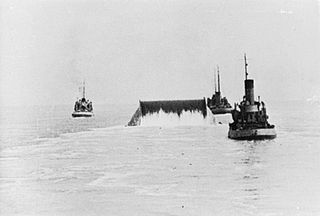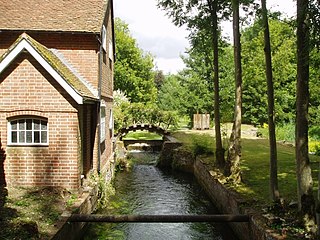
The Ministry of Defence is the department responsible for implementing the defence policy set by His Majesty's Government, and is the headquarters of the British Armed Forces.

Operation Pluto was an operation by British engineers, oil companies and the British Armed Forces to construct submarine oil pipelines under the English Channel in support of Operation Overlord, the Allied invasion of Normandy during the Second World War.

Flax Bourton is a village and civil parish in Somerset, England. The parish, with a population of 715, is situated within the unitary authority of North Somerset, on the edge of Nailsea Moor on the A370 road 5 miles (8.0 km) south west of Bristol city centre.

The National Energy Technology Laboratory (NETL) is a U.S national laboratory under the Department of Energy Office of Fossil Energy. NETL focuses on applied research for the clean production and use of domestic energy resources. It performs research and development on the supply, efficiency, and environmental constraints of producing and using fossil energy resources while maintaining affordability.

Claydon is a village just north of Ipswich in Suffolk, England. The meaning of the name is "clay-on-the-hill".
The United Kingdom petroleum pipeline network is principally made up of three pipelines systems: the former Government Pipeline and Storage System (GPSS) now the Exolum Pipeline System; the Esso pipelines, and the United Kingdom Oil Pipelines (UKOP) and associated pipelines. There are also several other lines including the Fina line built around 1990 that runs from North Lincolnshire to the Buncefield oil depot near Hemel Hempstead.

The Exolum Pipeline System, formerly the CLH Pipeline System and the Government Pipelines and Storage System (GPSS), is a fuel pipeline system in the United Kingdom. Originally constructed by the government to supply fuel to airfields in World War II, it is now owned by Exolum.
British Pipeline Agency Ltd (BPA) is a joint venture, established in 1969, between BP Oil UK and Shell UK. The company operates the UK oil pipeline network of oil pipelines which transport petroleum products around the UK.

Rowfant was a railway station on the Three Bridges to Tunbridge Wells Central Line in the parish of Worth, West Sussex. The line closed in 1967, a casualty of the Beeching Axe. The route of the railway line cut a path through the estate of Curtis Miranda Lampson, a wealthy American fur trader and vice-chairman of the Atlantic Telegraph Company, who agreed to sell his land cheaply to the London, Brighton and South Coast Railway (LBSCR) on condition that a station be provided, together with the right to stop trains on request. Apart from Lampson's Rowfant House the only other nearby residence was Worth Hall owned by John Nix, an LBSCR director. At Lampson's request a shelter was provided for his coachmen. Before and during World War Two an Air Force Reserve Storage Depot, was constructed adjacent to the station and railway line.

Itchen Abbas is a village and former civil parish, now in the parish of Itchen Valley, in the Winchester district, in the county of Hampshire, England. The village is on the River Itchen about 4 miles (6.4 km) north-east of Winchester.

Royal Naval Armaments Depot Coulport, shortened to RNAD Coulport, on Loch Long in Argyll, Scotland, is the storage and loading facility for the nuclear warheads of the United Kingdom's Trident programme.

Hindustan Petroleum Corporation Limited (HPCL) is an Indian public sector undertaking in petroleum and natural gas industry, headquartered in Mumbai, and a subsidiary of the Oil and Natural Gas Corporation (ONGC), which is owned by the Ministry of Petroleum and Natural Gas, Government of India.

Defence Equipment and Support (DE&S) is a trading entity and joint-defence organisation within the UK Ministry of Defence. It began operating on 2 April 2007, following the merger of the MoD's Defence Procurement Agency and the Defence Logistics Organisation, under the Chief Executive Officer of Defence Equipment and Support.

Plumley is a village and civil parish in Cheshire, England, with a population of 643 at the 2011 census.
Redmile railway station served the villages of Redmile and Barkestone-le-Vale, Nottinghamshire and also Belvoir Castle. It was on the Great Northern and London and North Western Joint Railway. It opened in 1879 and closed to passengers in 1951.

The Exolum Group is a Spanish multinational company offering services for transportation and storage of oil products. The Exolum Group is made up of Exolum Corporation, S.A., Exolum Aviación, S.A., Terminales Químicos, S.A. (Terquimsa), CLH Pipeline System Ltd (CLH-PS) in the United Kingdom, CLH Aviation Ireland in Ireland, CLH Panamá and CLH Aviación Ecuador. The company was formed from what used to be (CAMPSA). CLH is the result of the 1992 spin-off of the commercial assets of the former CAMPSA, which was carried out as the culmination of the process of deregulating the oil sector following the passing of new European Community laws that ended the oil monopoly. The Exolum Group's main activity consists of transporting oil products – essentially gasoline, diesel, fuel oils, and aviation fuels – from oil refineries to the storage facilities that the company has in Spain, The Netherlands, and The UK where its customers' tank trucks load these products and deliver them to the final consumers. CLH holds logistic service contracts for the use of its facilities with most of the operators in these countries, and competes with more than a dozen logistics companies that provide storage and transportation services to the Spanish market.

The Single Source Regulations Office (SSRO) is a non-departmental public body in the United Kingdom responsible for overseeing and monitoring the Single Source Procurement Framework established by Part 2 of the Defence Reform Act 2014. Its role is to monitor the level of profit that the Ministry of Defence pays out to its contractors when contracts are not tendered competitively.
Oil terminals are key facilities for the import, export, storage, blending, transfer and distribution of oil and petroleum products. Many terminals are located at coastal sites, such as Teesside and the lower Thames, to allow the offloading and loading of coastal shipping. Inland terminals, located around major cities, such as Birmingham and Manchester, facilitate the distribution of products to local industrial and commercial users. Many terminals have road tanker loading equipment for local distribution of products such as petrol, diesel, and heating oil. The terminals are connected through a network of underground pipelines to enable the transfer of oil and refined products across Britain.

The Oil and Pipelines Act 1985 is an Act of the Parliament of the United Kingdom which established the Oil and Pipelines Agency to buy, sell or deal in petroleum and to manage on behalf of the Crown petroleum pipelines and storage installations. The act abolished the British National Oil Corporation and transferred its assets to the Agency.
















